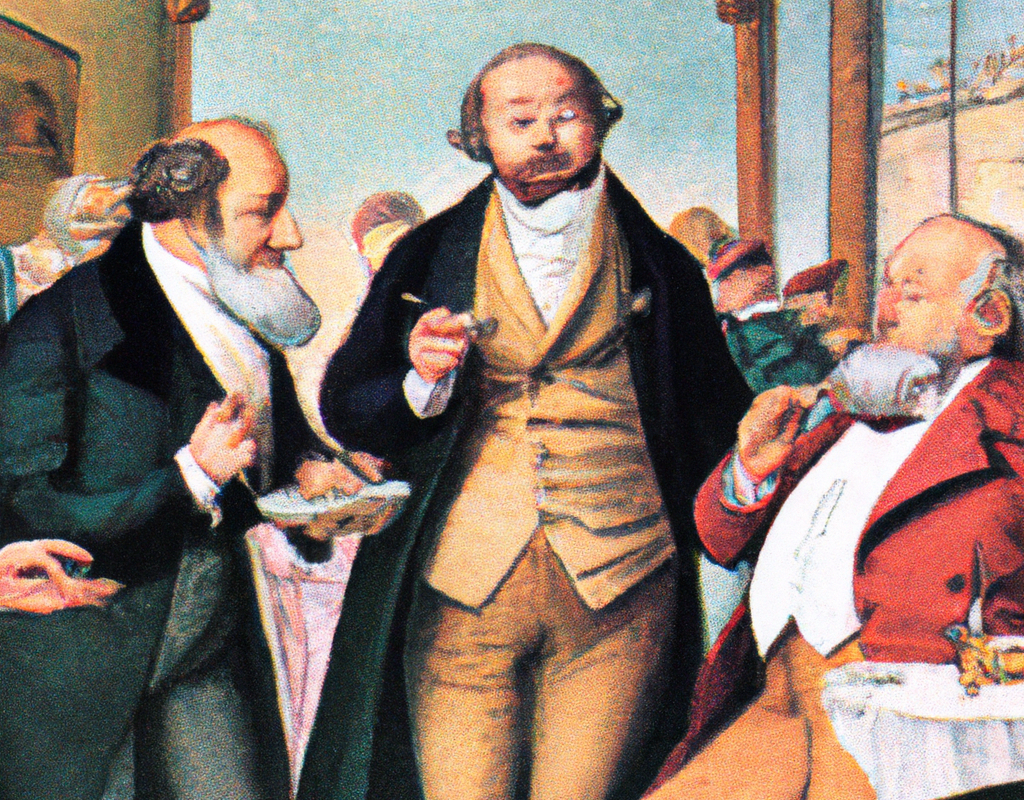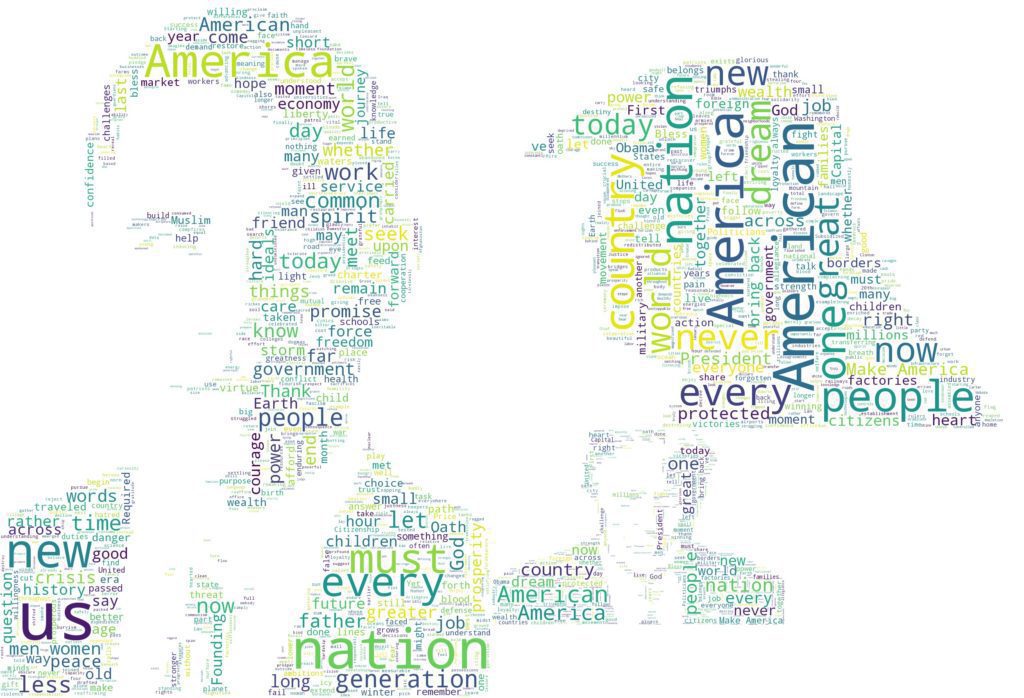Please Note: This is very much a work in progress and much of the timeline hasn’t yet made it from my notes and scribblings into the Timeline.js environment that makes this interactive data visualization possible. Stay tuned… but for now, at least you can get a bit of a sense how deep this #Russiagate rabbit hole goes.
Oligarchy and the Creep of Fascism
Some people like to argue that more economic inequality is a good thing, because it is a “natural” byproduct of capitalism in a world of “makers and takers,” “winners and losers,” “wolves and sheep,” [insert your favorite Manichaean metaphor here]. However, too much inequality is deleterious for both economics and politics — for with oligarchy comes the creep of fascism.
Those who amass exorbitant wealth often increasingly use a portion of their gains to capture politics. While the mythological premise of trickle-down economics is that we must not have progressive taxation, because giving more money to the already wealthy is the only way to spur economic investment and innovation and create jobs — in actual fact the majority of tax cut windfalls go to stock buybacks, offshore tax havens, regulatory capture, political lobbying, and campaign donations in the form of dark money (and regular money). All this is a runaway amplifying feedback loop that tilts the playing field further away from equal opportunity, social mobility, and democratic process — the original American Dream.
In the oligarchy, your vote doesn’t matter
Wealthy elites seek to preserve the power structures that have benefitted them, and keep them (and their descendants) in the ruling class. It is a slow recreation of the aristocratic societies of old Europe that we fought a bloody war of independence to separate ourselves from. Yet the erosion of civil values, public engagement, and collective will — largely as fomented by the conservative elite over the past 50 years in America — and the ascendancy of the myth of “rugged individualism” have conspired to create a perilous condition in which corruption operates so openly in today’s White House [2018] and Wall Street that democracy itself is in great danger. The creep of fascism is felt in the fell winds that blow.
Moreover, we have learned these lessons once, not quite a century ago, yet have forgotten them:
“Where there is a crisis, the ruling classes take refuge in fascism as a safeguard against the revolution of the proletariat… The bourgeoisie rules through demagoguery, which in practice means that prominent positions are filled by irresponsible people who commit follies in moments of decision.”
— Czeslaw Milosz, The Captive Mind
All politics is identity politics
There is no point belaboring a “stop the identity politics!” argument because there is simply no way to excise the political clash of factions from the identities of those factions. There would be no point in clashing if there were no identities.
There is no polity without identity. The root of the word itself in ancient Greek referred to the relationship between a citizen and the state, and the rights one has in relation to that state. Whereas individual communities have historically had rights infringed — often precisely because of their identities — it is of course a logical imperative to defend one’s rights under the rule of law. You use whatever tactics are available to you and that your ethics comport with to get your rights. All factions would do the same.
Some might say the predominant historical thread since the founding of this nation is the gradual parity-seeking of the many groups that have migrated here over the past 241 years (and much longer still, before that). Most of them have had a long, hard road; many of them still do; and still new groups are becoming the focus of persecution in America as time goes on.
Economics is also identity
How does one even have a political position without an identity? I often hear “economics” presented as the “alternative” to discussing identity, as if one’s economics can be separable from one’s identity; as if economics is separable from history (or as Jefferson called it, the “dead hand of the past“); as if economics is separable from one’s nationality; as if one’s choices in life have no relation to one’s station, or aspiration.
James Madison — the primary architect of the Constitution and the Bill of Rights — himself believed the unequal distribution of property was itself the most common cause of factionalism. There aren’t a lot of rich socialists. There aren’t a lot of poor Libertarians. So it goes.
The question isn’t whether or not we talk about identity — the political question is “whose identity(ies) do we talk about?” Who gets resources, accolades, airtime, contracts, lucrative careers, investment funds, bailout funds, bail funds, etc. etc. Who gets rights, and who doesn’t.
There are mathematically-speaking two predominant positions one can take on this question:
- we all have equal rights
- some groups should have more rights than others
The former position is the classic view of liberal political philosophy (not to be confused with liberal economic policy, with which it is much conflated to all our detriment). The latter position is a belief in supremacy. Typically, this belief is accompanied by the belief that one’s own group is, of course, the dominant group and that other groups are the inferior groups that ought to be generally submissive to the in-group. It is rooted in collective narcissism and, throughout history, has led to ill ends from abuse to genocide and everything in between.
Unsurprisingly to game theory or statistics, each faction tends to have such believers amidst its distribution of policy positions and political leanings. Some are more militant than others (quite literally). But clearly the nation’s founders in any of even the most skeptical reads believed in the former, however, and intended it to be the law of the land for their fledgling republic — as we know from the driving words of the Declaration of Independence:
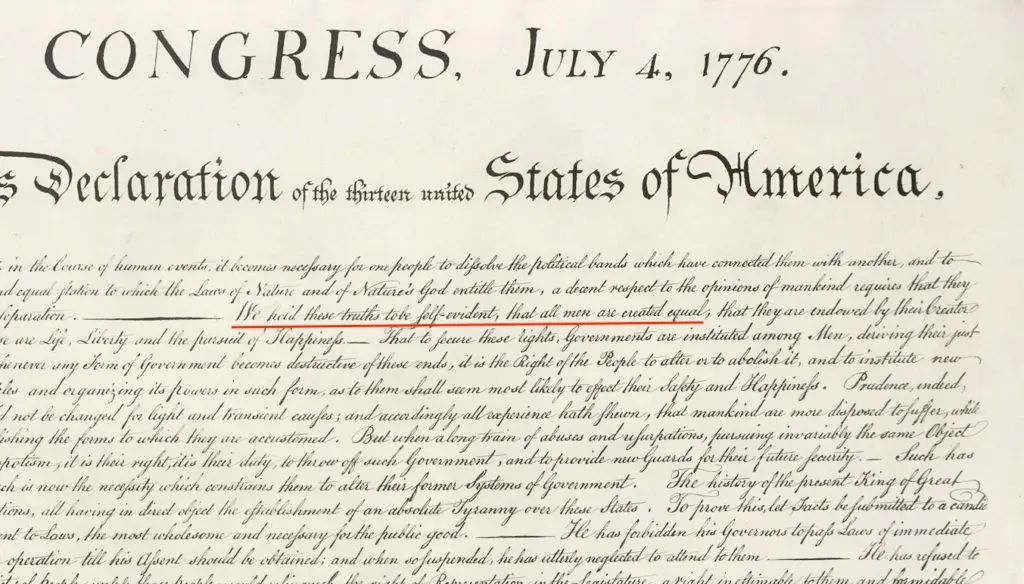
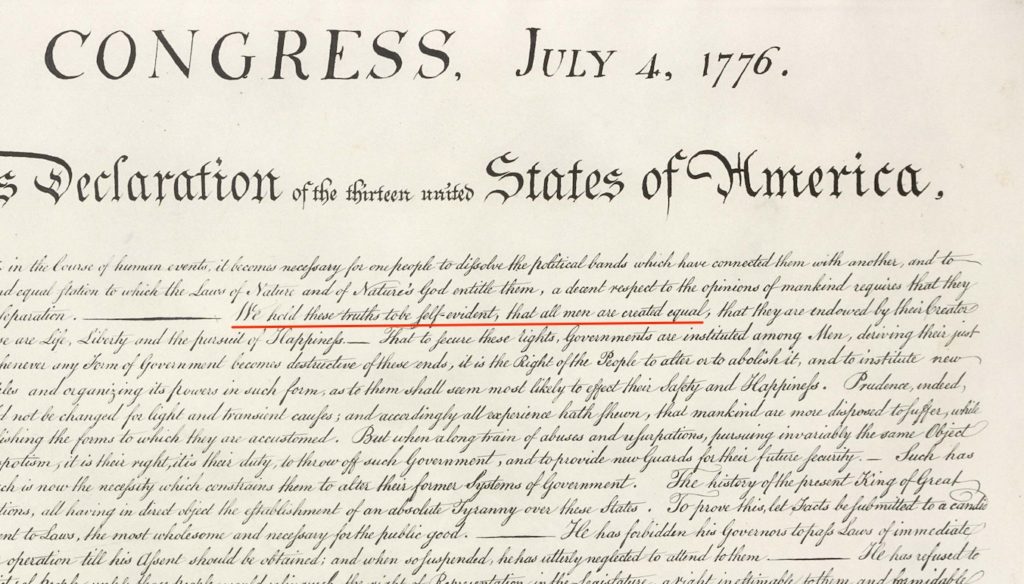
Whether we can live up to it is the question still, as it was when it began. In our time the “question” appears to loom large once again — a time when it is convenient for the powerful and wealthy to avoid even sharper scrutiny from a public set against itself like dogs trained for a fight. We all must have an answer to the question: equality or supremacy?
Your answer becomes part of your identity and thus, your politics.
Worldwide Governance Indicators, 1996 vs. 2015 in maps
Times change. And us with them.
Voice and Accountability
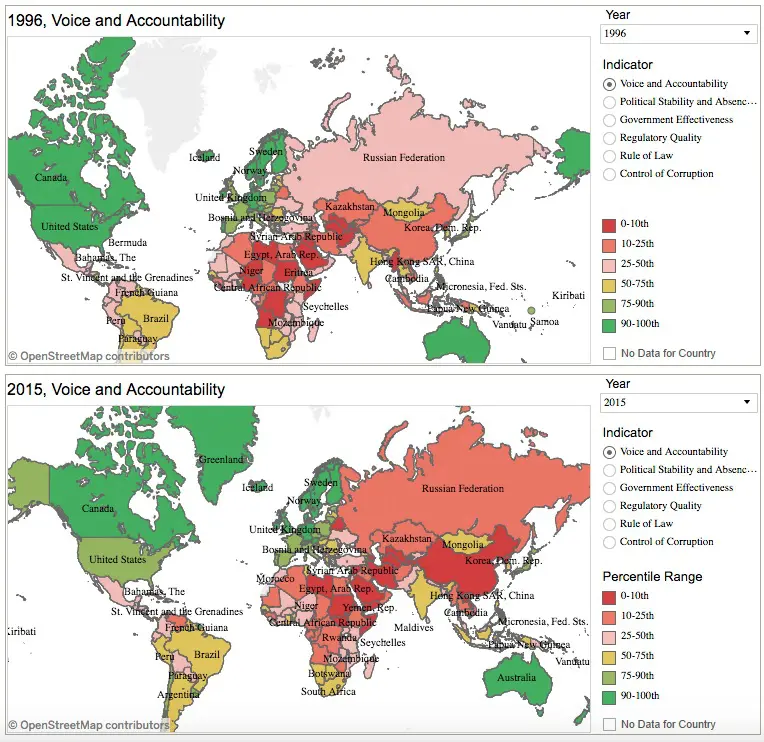

Political Stability and Absence of Violence/Terrorism
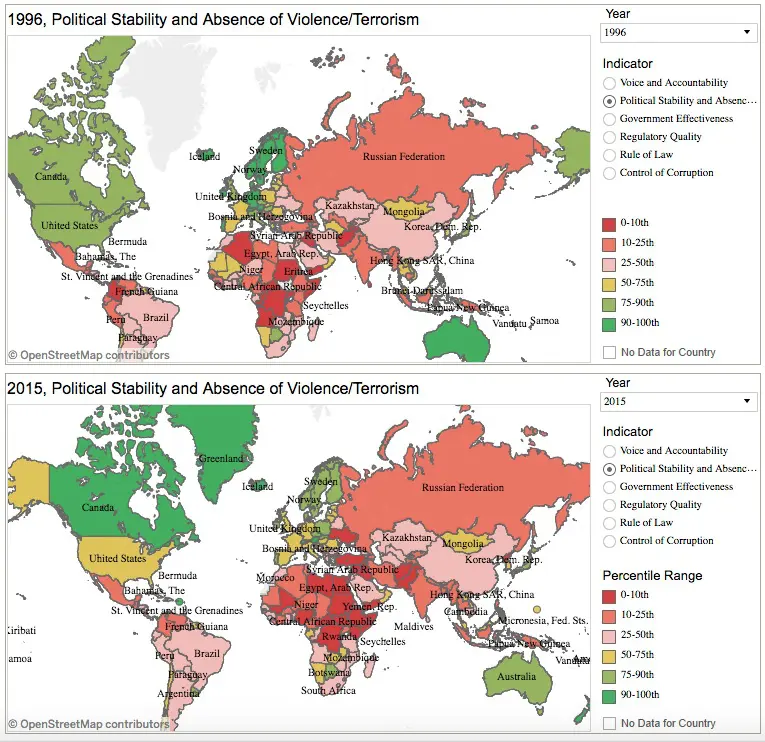

Government Effectiveness
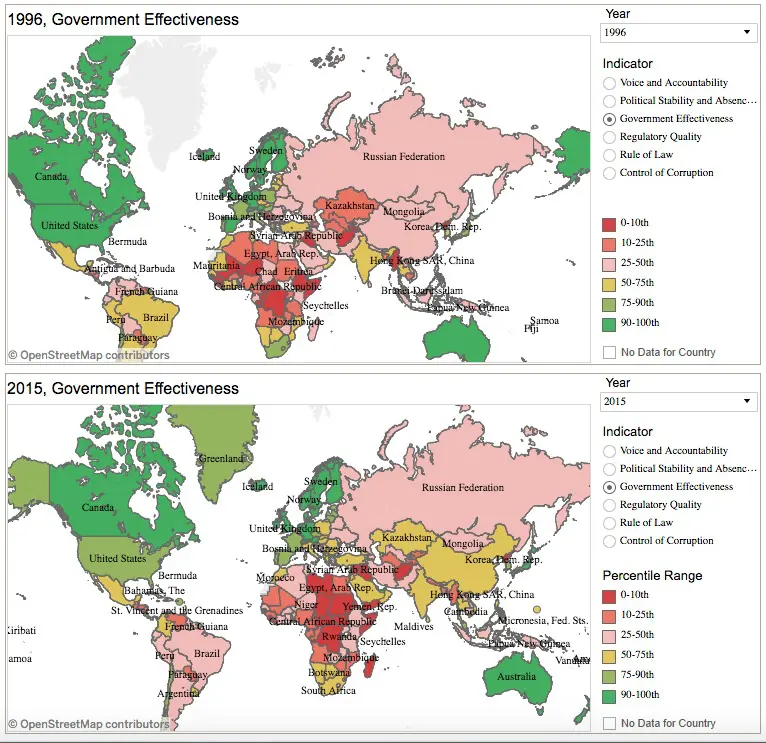

Rule of Law
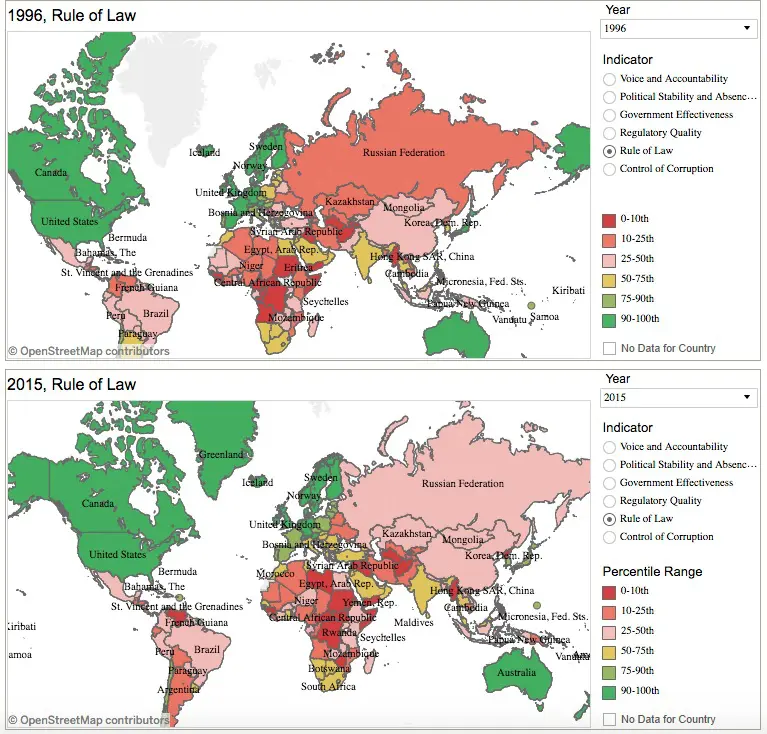

Control of Corruption
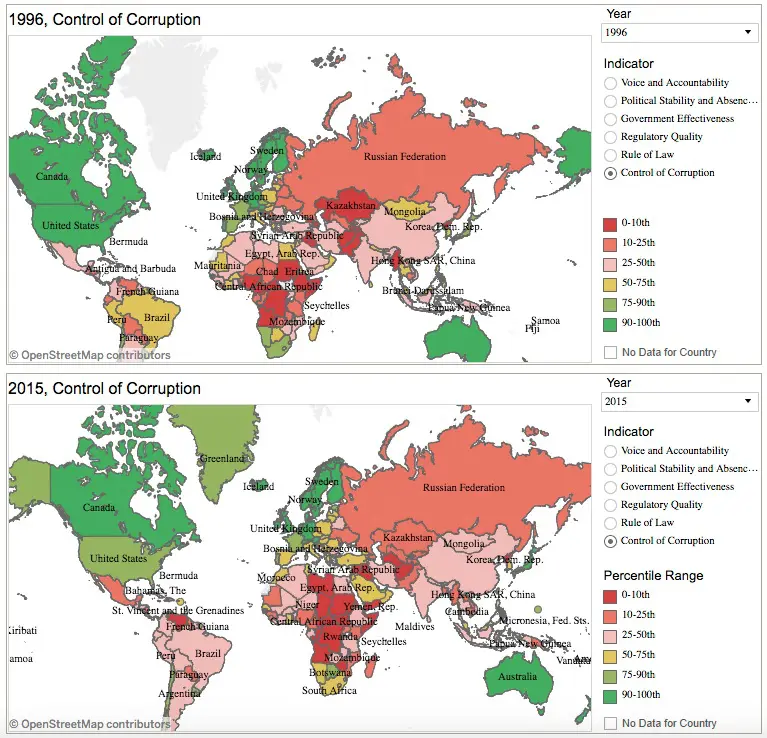

Data from the World Bank: http://info.worldbank.org/governance/wgi/index.aspx#reports
Obama vs. Trump inaugural address word cloud portaits
Free Press: On the dangers of attacking the media in a democratic republic
“The most dangerous ‘enemy of the people’ is presidential lying–always. Attacks on press by @realDonaldTrump more treacherous than Nixon’s”
— Carl Bernstein, journalist who broke the Watergate scandal
“These systematic attacks on the media accomplish two things. First, they fire up the base, which believe that traditional media do not represent their interests or concerns. Second, they provoke the media itself, which feeling threatened, adopts a more oppositional posture. This in turn further fuels the polarization on which the leaders depend and paves the way for the government to introduce legal restrictions.
The most dramatic example was in Venezuela, where elements in the media embarked on a campaign of open warfare, engaging in overtly partisan coverage intended to undermine Chávez’s rule. Some media owners were alleged to have conspired in a 2002 coup that briefly ousted the president. Once Chavez returned to power, he rallied his supporters behind a new law imposing broad restrictions on what the media could and could not cover under the guise of “ensuring the right to truthful information.” Across the hemisphere, other restrictive legal measures were adopted, including Ecuador’s notorious 2013 Communications Law, which criminalizes the failure to cover events of public interest, as defined by the government. In the first year, approximately 100 lawsuits were filed under the law, stifling critical reporting.”
— Columbia Journalism Review
“Brian Stelter, in his Reliable Sources newsletter, rounds up elite-media Twitter reaction:
- NPR’s Steve Inskeep: “A journalist is a citizen. Who informs other citizens, as free citizens need. Some are killed doing it …” NYT’s Maggie Haberman: “He is fighting very low approval ratings. Gonna be interesting to see how congressional Rs respond to this tweet”
- Joe Scarborough: “Conservatives, feel free to speak up for the Constitution anytime the mood strikes. It is time”
- NBC’s Chuck Todd: “I would hope that our leaders would never believe that any American desires to make another American an enemy. Let’s dial it back.”
At the same time, understand that this is partly a game to Trump. His confidants tell us he intentionally exploits the media’s inclination to take the bait and chase our tails.”
— Axios
John McCain:
“… slammed President Donald Trump’s attacks on the media this week by noting dictators “get started by suppressing free press.”
It was a startling observation from a sitting member of Congress against the President of the United States, especially considering McCain is a member of Trump’s party.
“I hate the press,” the Arizona Republican sarcastically told NBC News’ Chuck Todd on “Meet the Press.” “I hate you especially. But the fact is we need you. We need a free press. We must have it. It’s vital.”
But he continued, “If you want to preserve — I’m very serious now — if you want to preserve democracy as we know it, you have to have a free and many times adversarial press,” McCain said in the interview. “And without it, I am afraid that we would lose so much of our individual liberties over time. That’s how dictators get started.”
Evan McMullin:
“Authoritarians routinely attack checks on their power and sources… Donald Trump does exactly that.”
http://www.cnn.com/videos/tv/2017/02/05/are-trumps-attacks-on-media-authoritarian.cnn
“The freedom of the press is one of the greatest bulwarks of liberty, and can never be restrained but by despotic governments.”
— The Virginia Declaration of Rights
On the upsides of being underestimated, and a call to stand
There’s something those of us in marginalized groups know instinctively, having lived lives long in opposition to a dizzying continuum of Absurd Moral Authority: from outright violence, to secretive “technical” manipulations of statutes designed to erode or remove rights, to vague and carefully unstated “wink wink nudge nudge” moments from individuals of authority who had some power to constrain us — whether it’s a boss (or potential boss), a teacher, a community figure, and/or perhaps most guttingly a family member.
We know the sting of being scolded for even daring an attempt at upsetting the Tautological Supremacist Meritocracy: “If you weren’t worthless, you’d already be here by now!”
The British thought we would just roll over too
But we should remember one of the primary reasons that we as a nation even won our independence in the first place:
We were underestimated.
Lord North offered tax relief to the colonies that would help “defend the motherland” in February, 1775 — none took him up on it. And in fact, the Conciliatory Resolution only deepened the growing sense of unity emerging against what increasingly became perceived as a Common Enemy. The attempt to divide and conquer not only failed, but backfired.
The British Parliament thought the colonists full of hot air — that a few shows of military force would quickly crumble the upstart radicals in their quest for representation and rights. But battles at Lexington and Concord only fueled further the sentiment that the colonies were inhabited by an occupying force that must be resisted.
It was widely thought to be insane to stand against the world-renowned military force of the British Empire — but the Continental Army under George Washington doggedly turned the fact of underestimation to their advantage via innovative battlefield strategy. The motherland, finding it difficult to raise sufficient troops to fight against their own former countrymen, hired German mercenaries to fight against the colonists — further deepening the resolve of the Americans to throw off an oppressor willing to bring foreign assassins to bear in a dispute formerly perceived as a conciliatory process of achieving the basic rights of citizenship that colonists’ forbears once enjoyed in England. The British overestimation of Loyalist support — combined with the general mistreatment of those who did cross the “revolutionary picket line” — only added to the troubles faced by a predominantly naval power slogging through a lengthy land war over vast territory.
Diversity does not preclude uniting to face a Common Enemy
In so many ways we’ve become more fragmented; more balkanized; more atomized in modern society. We’ve self-selected into our communities of shared values and our social media bubbles. In many ways this is the paradox of prosperity, and the Catch-22 of progress.
We may feel stronger in our own foxholes, but there comes a time when the whole choir must sing together. Now is that time.
And perhaps it is dangerous to use the language of war, and of conflict — or perhaps it may help us to better identify where our Common Enemy lies. Our Common Enemy is not the down at heel rural Trump supporter who lashes out at us in fear, and in retaliation — though their words are often hateful, these people have been misled.
It’s a very old story — older than Trump; older than George W. Bush; older than Reagan or Nixon or Coolidge or Jackson or Johnson. The wealthy white elite has a centuries’ old playbook of dangling so-called Christian morality in front of those whites left most destitute by the former’s economic policies — and winning.
We are watching reruns.
This time, fascism and foreign influence have been added to up the ante — keeping even the most blasé among us glued to our seats.
Stand up
The framers of our Constitution deliberated, debated, and agonized over the most ideal structure to support a broad pluralist power, in concerted opposition to the monarchies and aristocracies of the past. Many were shocked by — and fought bitterly against — the unprecedented act of beginning such a governing document with the words, “We the people.”
But 85 Federalist Papers later, our sovereign power was enshrined in the document that still governs our ambitions today — and acts as a backstop against those who would wield tyrannical power in our name.


Our Common Enemy is tyranny, and we must learn to recognize where it lives, and how it acts. Even — perhaps especially — when that domicile is the White House, and that act an act of Congress.
Our Common Enemy is those who would deny the power of the people to govern themselves: through the silencing of debate in a once great forum; through casual disregard of the judiciary branch; through an endless parade of troglodyte efforts at voter suppression.
Our Common Enemy is the long litany of elected officials who act in their own best interests at the expense of We the People. It is the slew of slick sycophants currying political favor with the powerful, who continually rewrite the rules of the game the Winners have already Won many times over, to accelerate the gaping gulf of inequality that threatens democracy, liberty, justice, and most certainly peace.
Without Justice there can be no Peace.
And those who wield injustice have vastly underestimated the swaths of citizenry who can see through the ruse; who have heard the old story and seen its outcomes; who are tired of having to wage the same struggles for rights and respect over, and over, and over again.
But the tired gain strength through camaraderie in adversity; through simple acts of kindness; through humor, and through love.
These are tools the tyrannical cannot access.
Stand, and wield them, in the name of We the People.
The 2016 election was the greatest criminal heist of all time
But we will grow from it, and they will not — over the long run, at least.
Things we need to improve upon and/or rebuild:
- media literacy
- civic literacy
- financial literacy
- data literacy
- tech literacy — especially security and privacy
A vote for Donald Trump is a vote against democracy
Be careful of our barnacled, crusty cynicism and the cavalier rabbit hole it could lead us down — away from the longest-running success story in human rights.
Democracy works only if political leaders put the common good ahead of personal interest. There is zero evidence Trump would even be equipped to deliver on this, should the interest in it ever be made to enter his mind.
SOTU word cloud: Make work, America. Obama OUT!


Some of the more interesting bits
From Obama‘s State of the Union speech, 2015:
- End of Afghanistan “mission”
- Appeal to double down on middle-class economics
- Increase availability and provide tax credit for quality childcare
- Getting paid sick leave laws on the books
- Wage equality
- Raising the minimum wage — “If you truly believe you could work full-time and support a family on less than $15,000 a year, go try it.”
- Lowering cost of community college to free
- Asks companies to provide more job training, hire more veterans
- Bi-partisan infrastructure plan to attract businesses / industries
- Trade deals in Asia, Europe — “95 percent of the world’s customers live outside our borders, and we can’t close ourselves off from those opportunities.”
- Precision Medicine Initiative — pursuing cures for cancer, diabetes; personalized health information
- Free, open, and fast Internet
- Colonizing space — “not just to visit, but to stay.”
- Closing corporate tax loopholes brokered by lobbyists
- Opposing Russia, supporting Ukraine
- Opening relations with Cuba
- Halting Iran’s nuclear program
- Legislation around cyberattacks, identity theft, and child data
- Pursuing climate change solutions, including getting China to commit to limiting their emissions for the first time
- Free speech; religious rights; LGBT rights
- Shutting down Guantanamo
- Transparency on surveillance; civil liberties vs. counter-terrorism
- Marriage equality
- American values vs. partisanship
- Plea for a better politics
- Appeal to debate and reason on divisive issues: abortion rights, immigration, voting rights, police brutality
- Mic drop — “I have no more campaigns to run.”


President Obama’s tech-centered State of the Union: full text, and digital rights concerns – Boing Boing. p.s. cool visualization of Twitter mentions during the speech (via srogers @ cartodb)


